




TASB Officers 2020-21
Jim Rice, Fort Bend ISD, President
Ted Beard, Longview ISD, President-Elect
Debbie Gillespie, Frisco ISD, First Vice-President
Bob Covey, Cypress-Fairbanks ISD, Second Vice-President
Armando Rodriguez, Canutillo ISD, Secretary-Treasurer
Lee Lentz-Edwards, Kermit ISD, Immediate Past President

TASB Board of Directors 2020-21
Moises Alfaro, Mathis ISD, Region 2
Kay Alley, Crosbyton CISD, Region 17
Rose Avalos, Aldine ISD, Region 4H
Kamlesh Bhikha, ESC 2, ESC Representative
Steve Brown, Ector County ISD, Region 18
Kevin A. Carbo, Mesquite ISD, Region 10D
Justin Chapa, Arlington ISD, Region 11C
Thomas Darden, Cooper ISD, Region 8
Jason Dohnalik, Cameron ISD, Region 6
Karen Freeman, Northside ISD, Region 20B
Corinne French, Valley View ISD, Region 11D
Demetrio D. Garcia, Kenedy ISD, Region 3
Linda Gooch, Sunnyvale ISD, Region 10B
Mary Jane Hetrick, Dripping Springs ISD, Region 13B
Tony Hopkins, Friendswood ISD, Region 4C
Sandy Hughey, North East ISD, Region 20E
Mark Lukert, Wichita Falls ISD, Region 9
Raymond P. Meza, San Felipe Del Rio CISD, Region 15
Dan Micciche, Dallas ISD, Region 10C
Vernagene Mott, Pflugerville ISD, Region 13C
Nicholas Phillips, Nederland ISD, Region 5
Jacinto Ramos Jr., Fort Worth ISD, Region 11B
Page Rander, Clear Creek ISD, Region 4B
Tony Raymond, Sabine ISD, Region 7
Georgan Reitmeier, Klein ISD, Region 4A
Rolinda Schmidt, Kerrville ISD, Region 20A
Cindy Spanel, Highland Park ISD, Region 16
Becky St. John, Grapevine-Colleyville ISD, Region 11A
Anne Sung, Houston ISD, Region 4D
Mildred Watkins, La Vega ISD, Region 12
Greg Welch, Clyde CISD, Region 14
Robert Westbrook, Schertz-Cibolo-Universal City ISD, Region 20D
APRIL
For more information about these events or deadlines, visit the TASB website at tasb.org or call TASB at 512.467.0222 or 800.580.8272 toll-free.
Sign
Today’s school libraries are much more than books. Librarians help teachers reach students digitally, create online guides, hold virtual information sessions, and much more.
Departments
2 Calendar
22 Legal News
26 Capitol Watch
28 Technology Today
30 News & Events

5
7 Editor’s Footnote
Research suggests that the time has come for school boards to challenge assumptions and prepare to make changes that will transform board governance and public education.
William Albert Bilsing II served on the Normangee ISD Board for an amazing 58 years. “Doc” Bilsing, who passed away in September 2020, led a remarkable life.
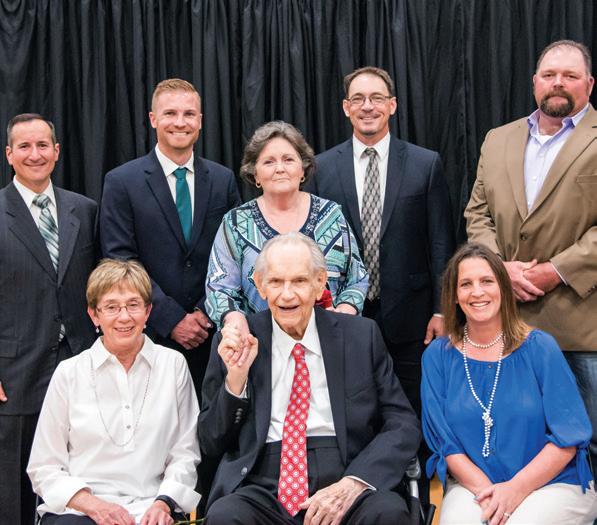
Texas Lone Star • Volume 39, Number 2
Texas Association of School Boards
P.O. Box 400 • Austin, Texas • 78767-0400 512.467.0222 • 800.580.8272
Roger White • Managing Editor
Melissa Locke Roberts • Assistant Editor Shu-in Powell • Graphic Designer
Patrick Morris, Virginia Hernandez • Photographers
Jackie Johnson • Advertising Coordinator 360 Press Solutions • Printer
Texas Lone Star (ISSN 0749-9310) is published 10 times a year by the Texas Association of School Boards. Copyright© 2021 by the Texas Association of School Boards (TASB). All rights reserved. Reproduction, adaptation, distribution, and exhibition in whole or in part are prohibited under penalty of law without the written license or permission of TASB. Copies of Texas Lone Star are mailed to trustees of TASB member school boards and their superintendents as part of their membership. Subscriptions are available to nonmembers for $36 (1 year), $69 (2 years), and $99 (3 years). Single copies are $5.
Address changes should be sent to Michael Pennant, TASB, P.O. Box 400, Austin, Texas 78767-0400.
Articles in Texas Lone Star are expressions of the author or interviewee and do not represent the views or policies of TASB. Permission to reprint should be addressed to the Managing Editor, P.O. Box 400, Austin, Texas 78767-0400.
Texas Lone Star does not guarantee publication of unsolicited manuscripts.

legislative session. Visit strongtexasschools.org
For more information about tasb.org and our related sites, contact TASB Online Communications at 512.467.0222 or 800.580.8272 or visit tasb.org/help/index.aspx.
Postmaster: Send address changes to TASB, P.O. Box 400, Austin, Texas 78767-0400.
Follow us:
Lock in low prices on your district’s energy through the PowerBuy® platform, a wholesale marketplace where sellers compete for your business in an online reverse auction. Achieve greater budget certainty with one of the largest electricity aggregators in the state of Texas.
Get started saving at energy.tasb.org.
Large districts can leverage their volume needs, while small districts benefit from economies of scale by being pooled with other districts.
On February 3, The Wall Street Journal published an op-ed piece by Daniel Henninger entitled “The Tragedy of the Schools.” His lead paragraphs stated: “Among its multiple alterations, the coronavirus pandemic of 2020-21 may be undermining the role of public schools in the United States, in place since the middle of the 19th century. It is a reassessment that is long overdue.

“A relevant anecdote is Ronald Reagan’s famous explanation that he didn’t leave the Democratic Party; the Democratic Party left him. Across the country the past year, that has been the experience of parents with children in many of the nation’s public systems—abandoned by schools they’ve supported with their tax dollars.”
a lot of parents, the search for alternatives will continue. It can’t happen soon enough.”
I am sure most of us involved in public education would vigorously disagree with Mr. Henninger’s viewpoints. Perhaps he could benefit from a tour of our school districts, attending an F2F class, or sitting in on a school board meeting. However unfortunate his thoughts may be, I have sadly found that many others share a similar point of view.
“Why is this?” one may well ask. After all, when the pandemic hit us the hardest in the spring of 2020, our public schools stepped up. We fed thousands of hungry children and provided laptops and internet hot spots to those students who needed them—at our own expense. Our teachers and administrators transitioned to virtual instruction in record time.
sick teachers when the substitute pool cannot fill a vacancy.
In short, you would be hard pressed to find anyone who has been left unscathed.
The COVID-19 pandemic has left us all with what I call “COVID angst.” Everyone seems to be stressed, ill-humored, and quick to criticize—which is why I find the recent efforts of public schools even more commendable. Through all these travails, our teachers, our administrators, and our school boards have continued to stand and deliver, making the best of difficult circumstances.
As we move forward into 2021 with evolving CDC guidelines for social distancing and self-quarantining and an increasing number of vaccinations becoming available, the public education system can and will continue to do its very best to ensure no child is left behind.
Mr. Henninger went on to contrast the pandemic-driven face-to-face (F2F) attendance rate of private schools to public schools, citing 60-percent attendance in private schools versus 25-percent attendance in public schools. He went on to opine the poor performance of public schools to educate our nation’s children. After a litany of complaints about school boards and teacher unions, he closed his article with the following comment:
“Inexorably, the pandemic is shifting the ground beneath public schooling. For
Though admittedly there are still some bugs to be worked out—as there are in many other aspects of COVID-19 life— our districts did yeoman’s service at a time of scant guidance from the federal or state government. We were on our own and did what was necessary to continue educating our kids.
To be sure, the past year has been hard. It has been a challenge for parents, who have struggled to continue their day jobs while also assuming a much larger role in helping their children in their daily studies. It has been a struggle for our teachers, who not only are teaching their students in newly socially distanced classrooms or virtually, but often have their own children to worry about, as well. It has also been a tough time for our administrators, who regularly fill in for
To all my fellow school board trustees, I know at times even we can suffer from COVID angst. Though we are all longing for the days when we could attend F2F meetings without concern, I urge you to continue to fight the good fight. It is now more crucial than ever that we encourage our students, our teachers, our staff, and our parents.
In so doing, you will be helping to uphold support of our nation’s public school system, in which generations of fathers and mothers have entrusted their children to learn and grow and to have their part of the American dream.H
It is now more crucial than ever that we encourage our students, our teachers, our staff, and our parents.
















Iactually remember the first time I set foot in my middle school library on my own. In other words, I wasn’t in there to complete a reading assignment or research a project as instructed by a teacher. I was there just to look around, to see if there really was anything interesting to read in our school library.
I checked out two books: the harrowing and powerful Hiroshima, by John Hersey, and Pro Football Heroes, by Steve Gelman. The pro football book was a natural for me, as I had been an avid football fan since early childhood. I learned about the greats of the past: Jim Thorpe, Knute Rockne, Red Grange, and others. But Hersey’s book, one of the earliest examples of what would later come to be known as the New Journalism, blew me away. I had never been so moved and shocked by mere words on a page.

especially in the time of COVID-19— libraries and their dedicated, resourceful professionals provide so much more for students and their families.
This edition’s cover story, written by Texas Library Association President Christina Gola and Texas Association of School Librarians Chair Kristi Starr, gives you a glimpse of some of the many services and resources school libraries offer to keep students learning during these unprecedented times.
As they note in this eye-opening article, “Since mid-March 2020, when schools closed their doors and adopted remote learning models, librarians began helping teachers reach students digitally, doing everything from collecting and dis-
tributing devices to creating online guides and holding virtual information sessions for students on how to access digital resources. They have also jumped in to help orient students and parents to online learning platforms and hosted curbside checkout days, where families can drive by and pick up books they reserve online.”
They also provide much-needed tech support, help set up Google and Zoom classrooms, answer copyright questions, tutor students on how to access digital publications, assist with website setup, and much more.
As the story’s headline suggests, this is not your parents’ school library.
Yet, in addition to this cornucopia of services school libraries offer today, they do still house a wonderful trove of books, just waiting for a student to crack open and explore—just waiting to set another youngster on the lifetime path of reading.H
From then on, I was a fan of the school library. That library, and a patient and sincere school librarian, set me on a lifelong path of ardent reading.
School libraries still hold that same treasure for students today, but now—
In the time of COVID-19, libraries and their dedicated, resourceful professionals provide so much more for students and their families.byChristinaGolaand Kristi Starr

n this COVID-19 era, when so much of learning is happening digitally, K-12 certified school librarians are more essential than ever. In many schools, the library is the largest classroom on the campus, and it is often considered the technology hub. In today’s world, that means librarians are facilitating students’ connections to virtual education and partnering with teachers and administrators to find creative ways to support learning.
Since mid-March 2020, when schools closed their doors and adopted remote learning models, librarians began helping teachers reach students digitally, doing everything from collecting and distributing devices to creating online guides and holding virtual information sessions for students on how to access digital resources. They have also jumped in to help orient students and parents to online learning platforms and hosted curbside checkout days, where families can drive by and pick up books they reserve online.


Mary Woodard, director of Library Services at Mesquite ISD, said that at the beginning of the 2020-21 school year, her librarians served teachers, students, and families by providing “tech support, tech support, tech support!”
Woodard added, “Our librarians are not only helping teachers but also students and their families by making home visits to set up hot spots, teaching parents to log in, creating video tutorials, and more. They are also supplying curbside checkout services, recording book talks, creating interactive lessons, and doing virtual library orientations.”
Woodard noted that now that Mesquite ISD has returned to in-person learning for some students, librarians continue to provide tech support for teachers who are learning to teach face-to-face students along with virtual students.
“Book access is provided through digital e-books and audiobooks, curbside pickup, concierge checkout, or limited browsing in the physical library,” Woodard said. “Librarians teach both in person and online via screencasts, video tutorials, or live sessions on Google Meet. They are finding new and creative ways to keep students involved.”
 Outside the North Mesquite High School Library, librarians Betsy Mangalath and Sherry Doran stand by to hand out books to students before summer break. They distributed more than 400 books on June 10 for student summer reading.
Photo courtesy of Mesquite ISD
Outside the North Mesquite High School Library, librarians Betsy Mangalath and Sherry Doran stand by to hand out books to students before summer break. They distributed more than 400 books on June 10 for student summer reading.
Photo courtesy of Mesquite ISD
'LIBRARIANS TEACH BOTH IN PERSON AND ONLINE VIA SCREENCASTS, VIDEO TUTORIALS, OR LIVE SESSIONS ON GOOGLE MEET. THEY ARE FINDING NEW AND CREATIVE WAYS TO KEEP STUDENTS INVOLVED.'


This transformation of the traditional librarian to campus digital learning specialist is hardly a surprise to those familiar with the evolving role librarians have played in their campus communities.
In 2005, the standards and guidelines for Texas school library programs addressed strategies for librarians to provide learner-centered technology and information access. The technology addressed focused more on following campus and district policies, access to an online catalog, provision of typically three to four computers in the library
space, integration of multimedia, and “electronic library resources.”
The revised Texas school library standards published in 2018 focused on the expectation that school librarians would fully embrace digital learning. Current library programs are expected to offer “equitable access to emerging technologies which provide curated and open access to a variety of print and digital resources. [Librarians] support best instructional practices and curriculum standards through the integration of resources while assessing the impact on student learning.”
When viewing job descriptions for librarians in many Texas school districts, it is not uncommon to find statements such as those from Lewisville ISD that applicants are expected to have experience with effective technology integration and that they:
• Engage learners using print and digital resources to access, create, and share content, as well as collaborate with other learners as global citizens
• Collaborate with teachers to design engaging learning experiences to integrate digital citizenship and information literacy skills into instruction
• Serve as instructional and technological leader on campus
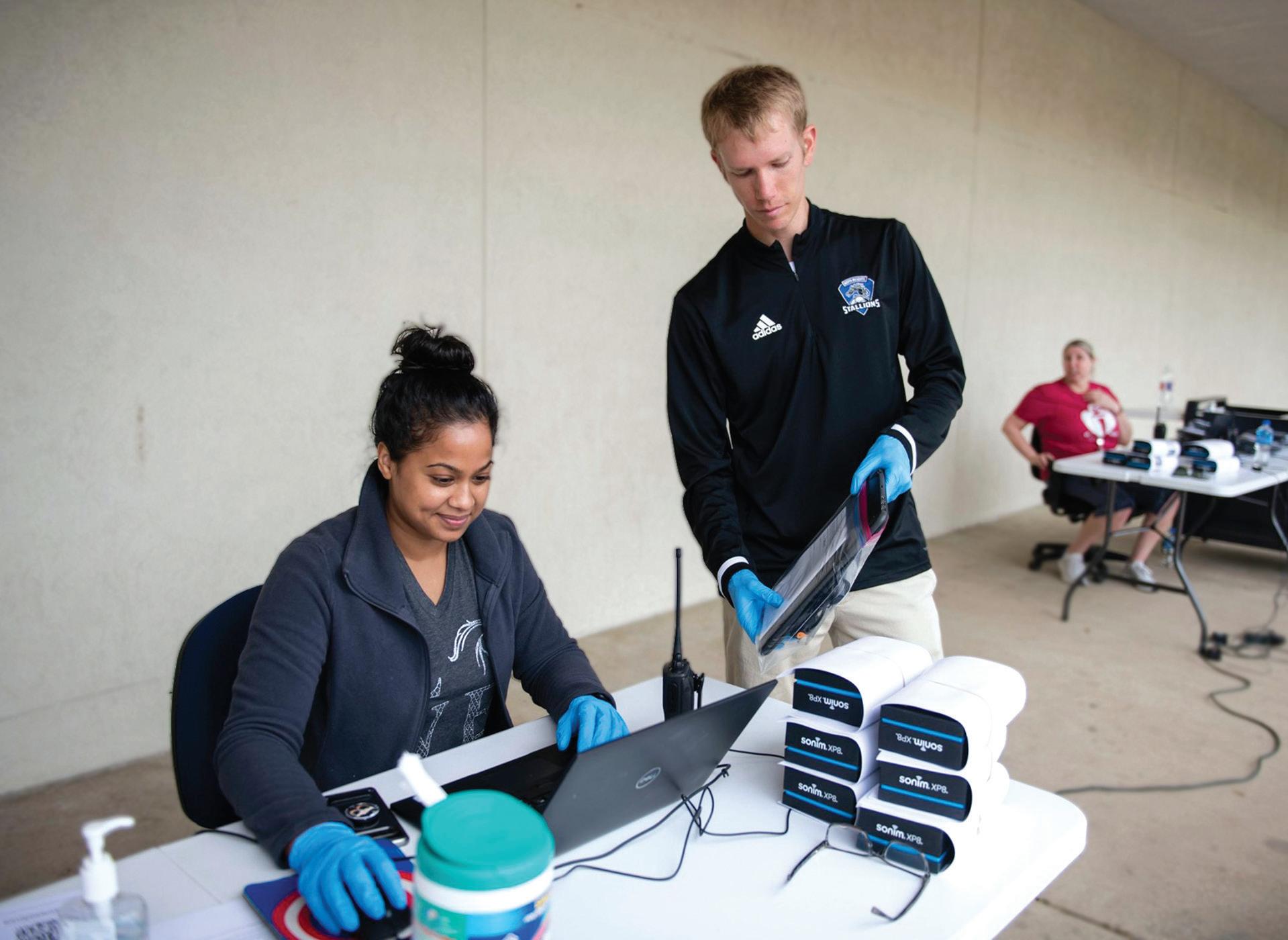
'LIBRARIANS SUPPORT BEST INSTRUCTIONAL PRACTICES AND CURRICULUM STANDARDS THROUGH THE INTEGRATION OF RESOURCES WHILE ASSESSING THE IMPACT ON STUDENT LEARNING.'
Today, school librarians throughout the state strive to continually master new software applications and skills. Elementary, middle, and high school librarians frequently serve as ambassadors for popular educational technology tools such as Flipgrid, Wakelet, and Buncee. They earn certifications and distinctions in Google, Microsoft, and Adobe. They teach and train students and educators on their campuses, in their districts, and at regional, state, and national levels at conferences. They often serve as webmasters or social media managers.

Throughout this school year, librarians across Texas have set up hundreds of Google classrooms and Zoom calls. They have answered questions about copyright and how to access digital books and information that is free and legal
to use and share. They have curated online resources for teachers, students, and families.
Since spring 2020, school librarians have encouraged and instructed students on how to check out e-books from their local public libraries and shared everything from storytelling videos to at-home craft demonstrations on YouTube with their students. To assist the teachers and administrators on their campus communities, librarians have built websites, recorded tutorials, shared technology tools and tips, and hosted virtual office hours.
And they have pivoted, in many cases, to safely reopening their in-person school libraries. They are quarantining returned books, sometimes in large, rolling carts color-coded for the day of the week the books are returned. Students must sanitize their hands before and after browsing, and only small groups of students are allowed in the library at a time.

'AND THEY HAVE PIVOTED, IN MANY CASES, TO SAFELY REOPENING THEIR IN-PERSON SCHOOL LIBRARIES.'
Some libraries have marked their libraries into zones: only three students can be in the “red zone,” for example, at one time.


Many favorite library activities are still taking place, but with a twist. Book fairs have moved online. Librarians are scheduling virtual author visits, where authors can present their work to students through virtual presentations and answer questions by video. And although many libraries have had to take down their “makerspaces” (collaborative work areas), some have transformed these activities into “takerspaces,” where children receive bags of craft materials and can follow along through video demonstrations.
At Judson ISD’s Judson High School (JHS), librarian Mariya Ortiz knows her “LaunchBag” kits of craft and art materials are needed now more than ever.
“Although the how of ‘makerspace’ has changed and evolved with the latest information about the virus, our library’s commitment to provide users with creative outlets is more essential than ever,” Ortiz explained. “Our JHS students and their families have felt the effects of poverty even more with increased unemployment due to COVID-19 restrictions and closures.”
Now students can request a LaunchBag of standard art supplies (scissors, gluestick, markers, pencils, color pencils, ruler, and crayons), paper (colored paper, construction paper, scrapbooking paper, etc.), and posterboard to make projects for their classes or for themselves, Ortiz said.
“We also offer colored pencils and pages from coloring books to give students and staff another way to relax,” she added. “When the LaunchBag supplies are returned, they get quarantined for seven days and sanitized before the next use.”
Because of the LaunchBags, students don’t have to worry about how to purchase art materials for their class projects or presentations—one less strain on their families during this time.
When you see students create art projects with loaned materials, enjoy books (whether print, audio, or digital), successfully log into their Google classrooms, beam about meeting an author through an online visit, or simply know that they have someone to turn to when they have a ques tion, you can thank your school librarian.
Families, teachers, and schools couldn’t do this with out them.

WHEN YOU SEE STUDENTS CREATE ART PROJECTS WITH LOANED MATERIALS, ENJOY BOOKS, SUCCESSFULLY LOG INTO THEIR GOOGLE CLASSROOMS, YOU CAN THANK YOUR SCHOOL LIBRARIAN.
Resources:

• The Texas School Library Program Standards and Guidelines publication provides a framework for self-assessment and strategic planning for district library programs to support student achievement and success. www.tsl.texas.gov/sites/default/files/ public/tslac/ld/schoollibs/sls/Texas%20School%20 Library%20Standards%20E-Version%20FINAL.pdf
• The School Administrator Toolkit contains a wealth of useful information, including interview questions for school librarian candidates, checklists for posting job descriptions, and strategies for creating a vibrant school library program. It is designed for school administrators and HR departments to better inform them when hiring and retaining library personnel. https://sites.google.com/g.risd.org/hiringlib/ home?authuser=0H
Christina Gola, director of Human Resources and Organizational Development at the University of Houston Libraries, is president of the Texas Library Association. Kristi Starr, librarian and campus technology co-leader at Lubbock ISD’s Coronado High School, is chair of the Texas Association of School Librarians.
The large tree had blown over and was now lying in what used to be the kitchen. What was once familiar was now barely recognizable. Talking to a local TV reporter, the homeowner was lamenting the recent loss. But with a determined look, the homeowner took a deep breath and said, “Our favorite shade tree is gone, and so is the kitchen. But you know, there were things wrong with that kitchen. We will build a better one. We have to see this as an opportunity.”
Such reframing of a situation and consequent rebuilding can be represented by a concept known as the J Curve. The J Curve hypothesis, originally introduced in 1962 by sociologist James C. Davies, describes a trendline showing an initial loss followed shortly by dramatic gain. It has been used in reference to medicine (getting sicker before experiencing recovery), political science/sociology (revolutions creating more chaos before effecting improvements), and even kitchen remodeling (the kitchen during construction becoming utterly dysfunctional before ultimately emerging better than before), and others.
The idea is that things often get worse before they get better, which often makes getting started too-long delayed. It is often said that by just getting started one is already half done. How the present situation plays out in terms of public schools will be up to local school boards. Perhaps we are nearing the bottom of the “J,” where we have the opportunity to build something better.
Events can create opportunities. Today’s triple events of the pandemic, the recession, and social protests are like the tree in the kitchen: They are events that have imposed changes across many segments of society. There’s little doubt there are spillover effects on public education. We may not get to choose when or what kind of events arrive at our doorstep. But we do have a choice of how to respond. Done well, the new public education that eventually emerges can be better than the old one.
It all depends on whether we perceive current events as an opportunity to enhance those things that work—and to adjust those things that need improvement.
Perhaps we are nearing the bottom of the “J,” where we have the opportunity to build something better.
Trustees can no longer be so cavalier about their duties given their sworn oath as elected members of school boards. This is the time to think about ways to better represent the communities within which we are embedded and better serve those within our care. These long overdue changes should not be based on personal preference, intuition, or political promises. Instead, changes should be based on 20+ years of research describing how the most effective boards go about their work.
This should be a time to set aside personal issues so boards can better attend to larger and more important matters known to be related to improved student achievement. Boards cannot expect to continue business as usual. We cannot deny the size and scope of the broad cultural changes we are currently experiencing. From instruction in the classroom to decision making in the boardroom, public education is being challenged and reinvented. Boards can either embrace and respond to the current reality or risk becoming irrelevant. The public will be insisting on assurances in (1) safety and security, (2) equity of supports and funding, (3) improved decision-making processes, and (4) a better return on public investments in education.
In response, boards will need to (1) act to protect all students and employees in their care, (2) guarantee monies are spent to ensure that all students have access to the programs and supports that address their needs (especially those students facing poverty and minority students previously ill served), (3) embrace decision making that is open and data driven, and (4) better engage the larger community in an ongoing relationship dedicated to making
the school a vital part of community life. No longer can public education focus on the preferred, the privileged, or the “easy” students and use their experiences as evidence of district success.
Many students living in poverty and most minority students predictably do not achieve in school at the same level as white and advantaged students. However, there are enough districts in the United States that have reversed this inequity to know the disparity is not inherent.
Those groups of underserved students do achieve at high levels when programs and policies are enacted to address their needs. This cements the idea that certain groups underperform not because they are incapable but because of false expectations, discriminatory policies, and systemic district inattention.
If public education is to truly serve the needs of the public, then changing current expectations, policies, and supports is morally required of today’s education leaders. No one should ever have to negotiate for their own equity. Rather, this is a duty for the board. Lessons can be learned by studying the districts who have done this.
This should be a time to set aside personal issues so boards can better attend to larger and more important matters known to be related to improved student achievement.
The public will soon include new voices demanding equal access, fairer treatment, and high performance for their children. Inequities in services will no longer be tolerated by those who have now found their voice. It is not an overstatement to say the ground has shifted under our feet.
The tree not only destroyed the kitchen but exposed the fact that the house is no longer sitting firmly on its foundation. It is easy to see a new kitchen is needed; but on closer inspection, we also need to build a broader foundation supporting the whole house.
Boards would do well to begin to consider these changes now. Budgets and programs needed to help the most vulnerable without putting the most privileged in jeopardy is the challenge and the new normal for public education. This can only be good news for students, schools, and the country as a whole. But for a board, this can be a troublesome dilemma: how to balance the needs of all the students against the needs of particular students.




It is well known that effective classroom instruction is the best predictor of student performance. What is lesser known is that competence and incompetence at the level of the board are also good predictors. Student achievement in any district can be reliably predicted simply by watching a board meeting. Board actions matter, and board members should be cognizant of this fact and concede their share of responsibility for the student achievement scores in their district.
Improving student achievement in any district may first require improvements in boardsmanship. However, changing board behavior is difficult.
Previous publications and research have described in detail the board actions that have statistical relationships












to high and low student achievement. So much detail was shared that perhaps most boards and their members found the ideas not relevant to their day-to-day duties. Perhaps this is because the ideas were too abstract, or maybe the boards failed to appreciate the sizeable influence their actions and inactions have on student achievement.
In any case, for too many boards, these suggestions were deemed unimportant and therefore were insufficient to motivate the board to enact necessary changes. As a result, improvement in boardsmanship has been resisted. In fact, some state school boards associations are so frustrated with board intransigence they have considered abandoning board training altogether. This is not good.
Perhaps now is the time to take another look at board improvements in a slightly different way. Rather than focusing on the details, it may be helpful to propose more concrete and strategic concepts in hopes of underscoring the urgency for change that recent events are requiring of public school boards.

Responding effectively to current realities will take courage and foresight. Those districts and boards that fail to step forward and acknowledge the new reality will fail in the duties contained in their oath to serve everyone fairly. The board’s job is not to focus on district details, but rather on the foundations, fundamentals, and finances related to the district’s broader mission. Boards need to get their own house in order, fix the foundation, square the house, and set the allowable budget and expectations of outcomes.
The administration and staff then take over to execute the plan and operate effective programs within the parameters set by the board. In the end, the house will once again sit firm, with not only a new kitchen, but a new foundation


that works for all the students who are fortunate enough to attend this effectively governed district.
Boards that have figured this out have lessons to teach. Several overarching notions have been found descriptive of the most effective boards that govern the highest-achieving districts. These boards tend to:

1. Be guided by an affirmative, long-term vision
2. Treat everyone with respect
3. Focus on important issues with districtwide implications
4. Be open to change
5. Emphasize strategic actions
6. Work to create a uniform, districtwide system of education
7. Take responsibility to address district characteristics
8. Believe all students can achieve at high levels
In contrast, the boards of underachieving districts tend to:
1. Be distracted by narrow, short-term issues
2. View some with contempt
3. Focus on urgent issues lacking districtwide implications
4. Promote/defend the status quo
5. Emphasize short-term tactics
6. Accept disparate achievement scores between student groups, schools, and neighborhoods
7. Deny responsibility for addressing district characteristics
8. Believe only some students can achieve at high levels
Looking back several years from now, it would be good to realize that public education had improved in several ways: First, that student needs influence budget development by reflecting efforts to serve all students according to individual needs (e.g., safety and equity); second, that boards respect
their proper governance role by reducing incidents of micromanagement; third, that board members resist making intuitive or political decisions and acknowledge that the most effective decisions align more closely with researchbased descriptors (e.g., Texas XG school board standards); and fourth, that because of the effective response, the general public has greater respect and appreciation for public education and is more supportive of the vital role of boards, administrators, teachers, and staffs.
Recent events appear to have caused permanent changes across society within which public education is embedded. There is no reason to believe this crisis will pass and all will return to normal.
We have needed a “new kitchen” for years, but getting started was postponed again and again. But now, getting started has been imposed. The smartest thing might be to see this as an opportunity and go beyond the immediate repairs to make other reasonable changes, as well. The old appliances still work, but why put them back in the new kitchen?
Let’s not be limited by fixing only the obvious. Let’s use this as an opportunity to create something of greater value for everyone. The time has come for school boards to challenge each business-as-usual assumption and prepare to make the necessary changes that will transform board governance and, therefore, public education into a system that achieves its ultimate goal: high achievement for every student.H
The board’s job is not to focus on district details, but rather on the foundations, fundamentals, and finances related to the district’s broader mission.Ivan J. Lorentzen is an education management expert and professor emeritus in Psychology at Flathead Valley Community College. William P. McCaw is a professor and the William C. Shreeve Chair in Educational Leadership at the University of Montana.
Just about 40 miles north of College Station, situated at the crossroads of the historic Old San Antonio Road and the once-bustling Houston and Texas Central Railway line, the town of Normangee is home to some interesting bits of history. The tight-knit community of approximately 700 residents, whose welcome sign reads “The Deerest Place in Texas,” is the birthplace of William Womack Heath, who served as US ambassador to Sweden during the Lyndon B. Johnson administration. Professional basketball player Joseph Jones, who starred for the Texas A&M team, also calls Normangee home.
However, one of the town’s greatest points of pride may be a Normangee ISD Board member. Dr. William Albert Bilsing II, known to community members as “Doc” Bilsing or simply “Bo,” was a familiar face to just about every resident in the area. Bilsing, who served on the Normangee ISD Board for an amazing 58 years, passed away September 15, 2020—just days shy of his 95th birthday.
According to TASB records, Bilsing’s 58-year tenure on the Normangee ISD Board is possibly a state record—perhaps a national one—for local school board service. Bilsing served for decades, beginning in 1962. He took a two-year break from service in 1988-89, then rejoined the board in 1990 and served until his passing in 2020.
An Upbringing of Caring
Bilsing, born in Bryan on October 5, 1925, graduated from A&M Consolidated High School in 1941 at the age of 16. At that time, he was already becoming an accomplished pianist and harpist under the supervision of his
Dr. William Albert
Bilsing II, known to community members
as “Doc" Bilsing or simply “Bo,” was a familiar face to just about every resident in the area.
 by Roger White
by Roger White
mother. At the same time, his father instilled in him a love of the land and nature. He attended Texas Agricultural and Mechanical College (later Texas A&M University) until his induction into the US Navy in February 1944. He served as a torpedoman on the USS Curtis in the Pacific Theater during the latter years of World War II. He was honorably discharged from the Navy in June 1946, at which time he returned to college to finish his degrees in English and biology.
“Doc” then entered the University of Texas Medical School in Galveston, finishing with a residency in Florida. He moved to Normangee in 1954 and joined a local practice. A few years later he took over the facility, which became known as the Bilsing Clinic. At the time, the clinic was known as the smallest hospital in the state, having just six beds.
During his career, Bilsing delivered hundreds of babies, made countless house calls, conducted a family practice, performed surgery, and—after completing a psychiatric residency at Austin State Hospital in the early 1960s— worked for the State Hospital, the Texas Prison System, and the Dyer Home for emotionally challenged youth in Leona.
After closing the Bilsing Clinic in the mid-1970s, he continued his family practice from a home office. A town legend, Bilsing is remembered by almost every community citizen, each with a story to tell about how Bilsing helped their family in some way. He would often hold court in Rice Pharmacy or later in his big chair in his living room.
“It was a special time to get to be in a one-on-one conversation with him, and you often left realizing he knew more about you, your family, and where you came from than you did,” recalled Normangee ISD Superintendent Mark Ruffin. “His memory of stories and facts was astounding and remained so until the end. His mind was an incredible thing, and he was well versed in art, books, history, genealogy, finance, and the human experience
and condition. There really was not any subject he could not shine a light on, give you a different perspective on, or impart wisdom about.”
A strong believer in public education, Bilsing began his school board service in 1962. To put that in perspective, John F. Kennedy was president when Bilsing first sat at the dais. The Cuban Missile Crisis was the most urgent story of the day. Astronaut John Glenn became the first American to orbit the earth in the Mercury space capsule Friendship 7.
“When talking about the challenges Dr. Bilsing faced as a leader in our community during his time as a board member, you have to realize his service dates back to the early 1960s,” Ruffin explained. “The educational policy and legislation that have been enacted since the ’60s has had an immense impact on all aspects of education, and Dr. Bilsing provided his leadership throughout each of those monumental changes. Brown v. Board of Education, declaring segregation to be unconstitutional, occurred in 1954. But as history makes clear, all across the United States, including Texas, desegregation did not occur overnight. The challenges faced surrounding desegregation are just one example of incredible obstacles for which Normangee ISD was grateful to have Dr. Bilsing’s leadership.”
Former Normangee ISD Superintendent Gary Adams, who served from 1996 to 2008, remembered many spirited conversations with Bilsing.
“The board and I had a very amiable relationship during my tenure. The meetings were very businesslike and usually lasted about an hour. We would have refreshments after the meetings, and the members would make their way home—except for ‘Doc.’ He had an insatiable desire for knowledge and would quiz me for hours about educational issues and other topics. We both loved history and would challenge each other about various world events. I could
hold my own, but his knowledge was impressive. He even reenrolled in Texas A&M in his late 70s to audit calculus courses just to keep his mind active. He was truly a Renaissance man,” Adams said.
Superintendent Ruffin added, “‘Doc’ worked hard to bring positive changes and ideas to the Normangee school district. The district administration building was named in his honor several years ago, and this was something he was quietly proud of. He loved the Normangee school and lived to see three generations of his children attend. He delivered diplomas to his children on their graduation—and this was a very proud moment for him.”
Normangee ISD Trustee Charlotte Hemphill, who served alongside Bilsing for years, noted that watching Bilsing lead and learning from him as a colleague proved invaluable in her board service.
“Being on the board with W.A. Bilsing for 20-plus years was something that I wish all board members could experience. He was the most knowledgeable person when it came to finances, budget, laws of the school system, and so much more.
“Something that really stuck with me is that each year in May he would ask our superintendent if the graduating students were prepared to be vital members of society,” Hemphill added. “He wasn’t expecting them all to be doctors or lawyers, but he wanted them to all be prepared to be upstanding citizens. This shows the devotion he had for our school and our community. His interest in our town ran so deep partly because as a doctor he was present at the delivery of many of the students, parents, and grandparents of Normangee ISD. This made a lifelong relationship with the citizens of our community.”
“Dr. William Albert Bilsing II was a strong, influential force in the town of Normangee, in the life of his children,
and his friends,” Ruffin said. “His presence was larger than life, and his worldly wisdom and guidance made a difference to all who knew him.”
Bilsing is survived by his wife, Shirley, nine children, and 29 grandchildren and great-grandchildren.H
Roger White is managing editor of Texas Lone Star'The educational policy and legislation that have been enacted since the ’60s has had an immense impact on all aspects of education, and Dr. Bilsing provided his leadership throughout each of those monumental changes.'
The COVID-19 virus continues to affect school districts around Texas, including causing disruptions to how school board meetings are normally conducted. While most boards initially returned to inperson board meetings, many boards find themselves scrambling to change meeting plans when one or more board members or essential staff are exposed to the virus.
School boards must consider the notice and other Texas Open Meetings Act (OMA) requirements as they reschedule or shift meetings to a remote format. Following is a Q&A to help board members better understand their responsibilities and requirements:
Q: When does the OMA normally allow a board member to join a meeting by phone or videoconference?
A: Under the regular (pre-pandemic) OMA, a board meeting may be held by teleconference only if (1) there is an emergency or public necessity as defined by the OMA and (2) it is difficult or impossible to convene a quorum of the board at one location.1 Texas Government Code Section 551.127 allows meetings of governmental bodies, including school boards, via videoconference, without an emergency, if certain requirements are met.2 For example, a quorum of the board must be physically present at one location unless the school district extends into three or more counties.3 The location where the presiding officer is physically present must be open to the public during open portions of the meeting.4
And a meeting by videoconference must comply with numerous technology requirements, including guidelines set by the Texas Department of Information Resources (DIR).5 For more information, see TASB Legal Services’ FAQ document entitled Open Meetings Act: Remote Participation in Board Meetings at tasb.org/ services/legal-services/tasb-school-lawesource/governance/documents/omaremote-participation-in-bd-mtgs.pdf.
Q: How does the governor’s COVID-19 disaster declaration impact remote participation in board meetings?
A: On March 16, 2020, Texas Governor Greg Abbott suspended portions of the OMA to allow telephonic or videoconference meetings and to reduce physical congregations during the COVID-19 disaster. The suspension order is effective until terminated by the governor or until the disaster declaration is lifted or expires. For more information, see tasb. org/services/legal-services/tasb-schoollaw-esource/governance/documents/ texas-governor-suspends-certainprovisions-of-oma.pdf
The most frequent practical use of the suspension order by school boards during the pandemic has been to hold meetings via Zoom or other online platforms. These platforms are relatively easy to access and cost effective, and they do not need to meet the stricter DIR technical standards when used in compliance with the governor’s suspension order.

Notice of board meetings conducted under the suspension order must be
posted in a manner that looks slightly different from your typical OMA meeting notice. Specifically, the meeting notices for telephonic and videoconference meetings may be posted online only. The posting must still be online continuously for 72 hours unless the emergency notice exception allows one-hour notice. The online notice must include a toll-free dial-in number or a free-of-charge videoconference link, along with an electronic copy of any agenda packet.
The notice should also include any special instructions for members of the public who prefer to participate in public comment remotely. See TASB Legal Services’ Sample Notice/Agenda: Board Meeting by Videoconference or Telephone Call during Disaster due to COVID-19, included in TASB’s COVID-19 resources pages at tasb.org/covid-19resources.aspx.
Q: What if we already posted an in-person meeting but suddenly a board member tests positive or is exposed to COVID-19 and needs to join the meeting remotely?
A: First, the basic screening procedures recommended by the Center for Disease Control and the Texas Education
SAN ANTONIO
June 16–19, 2021
FORT WORTH
June 23–26, 2021
RICK RIGSBY
Motivational Speaker, Educator, Author
Dr. Rick Rigsby is best known for his viral speech that garnered over 130 million views. He was a college professor at Texas A&M and chaplain for the football team. He motivates and inspires audiences and has published two popular nonacademic books.
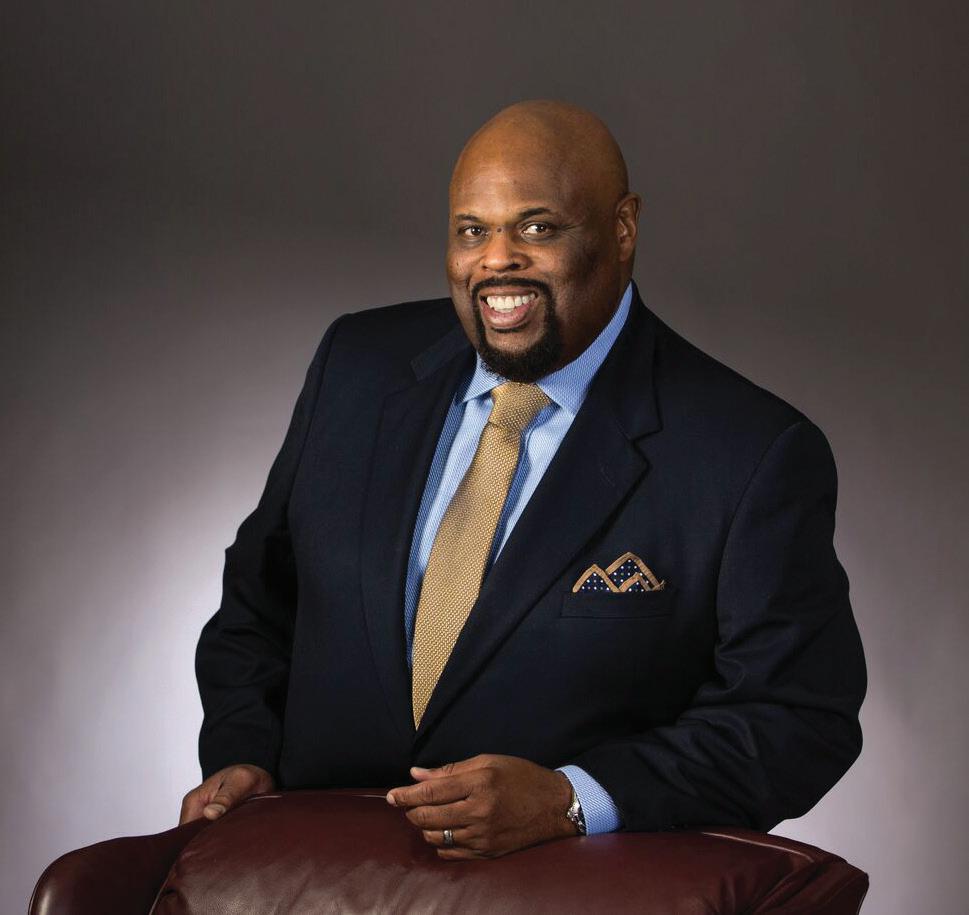
Agency indicate that a board member or employee who is in a period of quarantine or self-isolation due to the virus should not attend an in-person meeting.
If a quorum of the board is still able to physically meet, the absence of a board member or key staff member will not affect the conduct of school board business. That said, board members and key staff often feel well enough to participate remotely. The board has two options for allowing a board member or employee to attend and participate remotely:

• Videoconference under OMA: If the district has videoconference capabilities that meet the DIR guidelines, a board member could join by videoconference under Section 551.127. Using this option does not require the board to allow members of the public to access the meeting through the videoconference link. While public notice that individuals will join a meeting by videoconference is encouraged, the (pre-pandemic) OMA does not specifically require advance notice.
• Teleconference or videoconference under suspension order: The board may be able to rely on the governor’s suspension order to allow the board
GREGG WARD
Author, Speaker, Executive Coach
Gregg Ward transform lives through his writing, speaking, consulting, and development programs that focus on respectful leadership, emotional intelligence, and executive presence. Gregg has delivered more than 2,500 presentations around the world.

PEARL ARREDONDO
Educator, Advocate, and Author
Pearl Arredondo founded the first pilot mediafocused middle school established in the Los Angeles Unified School District. Pearl advocates for closing the digital divide and is passionate about increasing student access to technology in all schools.
CALL FOR PROGRAMS Session propositions are
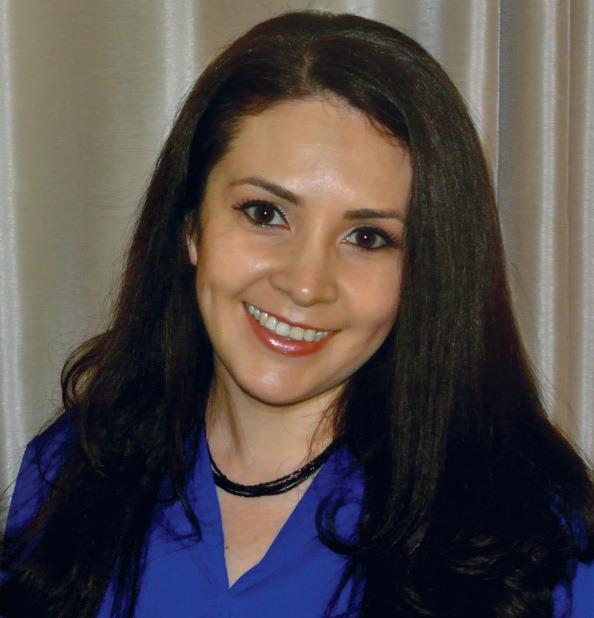
member to join by teleconference or videoconference. For example, the meeting could be held with a quorum in person and a board member or employee joining through an online platform (such as Zoom). This format is sometimes referred to as a “hybrid” meeting. The potential legal issue with this option is that the meeting was originally posted as an in-person meeting, not a remote meeting under the suspension order. No court or other legal authority has offered guidance about changing to a remote format with less than 72 hours’ notice. Consequently, boards deciding to use a remote link with fewer than 72 hours remaining before the meeting should consult their school attorney.
Q: Can a board member joining a meeting remotely speak and vote like any other member?

A: Yes, if a member is joining a lawfully conducted remote meeting either under (pre-pandemic) Section 551.127 for meetings by videoconference or under the
governor’s suspension order for teleconference or videoconference, the member is able to participate fully in deliberation and voting like any other member.
Q: Can we post meetings with both a physical location and a remote link?
A: Yes, if your community is experiencing community spread of the virus, both members of the board and members of the public may be hesitant to appear in person, even if the meeting is taking place at a physical location. The board may want to consider adding a toll-free remote callin number or online link to your meeting notices until the pandemic subsides to support public participation and allow for remote participation by board members and staff.
Q: What if an in-person meeting was posted, but community spread suddenly grows so widespread that a quorum cannot meet safely in person?
A: If more than 72 hours remain before the meeting, a revised notice can be posted that meets the posting standards for a remote meeting under the governor’s suspension order.
If fewer than 72 hours remain before the meeting and the meeting notice did not already include required information to also hold a remote meeting, then the board should cancel and reschedule the meeting. If the meeting notice already included sufficient notice of an additional remote meeting option that met the 72-hour posting requirement, then the board may proceed to convene remotely without also meeting in person. Of course, increasing communication to the community about this last-minute change will help reduce unnecessary confusion or complaints.
Q: What if the board wants to add a remote link for one or two members without canceling and reposting for a later meeting?
A: The governor’s suspension order permits a number of flexibilities to conduct remote meetings to promote public health during the pandemic. The order, however, provides that notice of a meeting under the suspended laws should be posted online continuously for 72 hours and include a toll-free dial-in number or a free-of-charge videoconference link,
along with an electronic copy of any agenda packet.
Under ideal circumstances, if a board meeting originally posted for a physical location needs to become hybrid or remote in reliance on the governor’s suspension order, the original meeting would be canceled and a new meeting would be posted online continuously for 72 hours with the necessary details. Technically speaking, the only justification for providing less than 72 hours’ notice of the location of a meeting would be an emergency as defined by the OMA.
Needless to say, pandemic circumstances are not always ideal. Your board may encounter a situation in which the board very much wants to keep its original meeting date and time, but for reasons of public health, individuals need to join remotely to prevent the spread of the virus. If you encounter such a circumstance, we encourage you to reach out to your school attorney. The attorney general’s (AG) office has fielded this question numerous times since the pandemic began, and while AG attorneys recognize that changing to a remote link with less than 72 hours’ notice is not ideal, they emphasize that the purpose
We can help your district best support special education, Section 504, English learner, and gifted and talented students through:

• Customized program reviews
• Special education workload staffing analysis
• Tailored training
• Special education operating procedures
888.247.4829
of the suspension order is to protect public health without losing public transparency.
If, with the blessing of your school attorney, you can move to a hybrid or remote option without sacrificing adequate public notice and public access, the underlying purpose of the suspension order will be fulfilled.
Q: May a professional service provider (such as an architect) consult with the board by videoconference when the board is meeting in person?
A: Yes. At a recent public training session, a representative of the AG's office informally opined that a governmental body, including a school district, may allow individuals like consultants or contractors, district employees, or auditors to participate remotely in the same manner that members of the public can. If a meeting is happening pursuant to the governor’s suspension order, the individual can address the board through the toll-free call-in number or online platform. Once meetings return to the pre-pandemic OMA, the individual may join by videoconference (even if the board is meeting in person) as long as the manner of remote participa-
tion and open meeting complies with the OMA. (See Tex. Gov’t Code § 551.127 [outlining videoconference requirements]).
Until formal or written guidance is issued by the AG's office, a board wanting to allow remote participation by individuals not expressly authorized or prohibited by the OMA should only proceed with legal advice about a particular arrangement, including applicable meeting notice and technical requirements.
This document is provided for educational purposes only and contains information to facilitate a general understanding of the law. It is not an exhaustive treatment of the law on this subject nor is it intended to substitute for the advice of an attorney. Consult with your own attorneys to apply these legal principles to specific fact situations.H
1Tex. Gov’t Code § 551.125(b).
2Tex. Gov’t Code § 551.127.
3Tex. Gov’t Code § 551.127(b).
4Tex. Gov’t Code § 551.127(e).
51 Tex. Admin. Code §§ 209.1-.11.
Julie Allen is a TASB Legal Services senior attorney. Joy Baskin is director of TASB Legal Services.
This year's TASA/TASB Legislative Conference, originally scheduled for February 23, has been rescheduled for Friday, March 12, due to weather complications. School leaders are urged to take part in the conference, cohosted by TASB and the Texas Association of School Administrators (TASA).
Because of COVID-19 restrictions, the meeting will be held virtually; school leaders are invited to participate in advocacy activities that involve calling and emailing their local legislators.
Attendees may use the Texans for Strong Public Schools website (texansfor-
strongpublicschools.org) to advocate in favor of continuing to fund schools using pre-pandemic attendance numbers and asking legislators to stand with communities and taxpayers by not censoring their elected officials from advocating at the Texas Capitol.
Governor Greg Abbott is scheduled to speak to attendees and recap some of the steps the state has taken to support public schools since last session. Lieutenant Governor Dan Patrick is also slated to discuss the Legislature’s support for education and some of his priorities for the upcoming session,
such as fully funding the school finance formulas. Texas Comptroller Glen Hegar will provide a look at the state budget picture.
Learn how new laws passed by the 87th Texas Legislature will affect your district during the TASB Post-Legislative Conferences in June. Conference dates are June 19 and June 26.

TASB Governmental Relations and Legal Services staff will provide an overview of new legislation that will impact Texas school districts. The conferences will be held in conjunction with the TASB Summer Leadership Institute (SLI) in San Antonio on June 19 and in Fort Worth on June 26. There will be a virtual version for those wanting to avail themselves of that option.
Board members will earn continuing education credit or may use attendance to fulfill the requirement that experienced board members receive an update on the Texas Education Code following a legislative session. Additionally, all PostLegislative Conference attendees also will receive a copy of the TASB 2021 Legislative Summary when the final document is completed.
Make sure your district’s advocacy issues are represented in the TASB Advocacy Agenda by submitting your proposed resolutions during TASB’s call for resolutions. Advocacy resolutions, which guide TASB’s response to legislative issues, are submitted directly by member districts.
Districts can add to the current advocacy resolutions, and there is no need to submit resolutions that are already contained in the Advocacy Agenda unless your district would like to amend that resolution. The revised agenda will guide TASB’s advocacy efforts during the interim of the 87th legislative session from fall 2021 through summer 2022.
Deadline for submitting resolutions is June 15.
For more information, visit gr.tasb. org or contact TASB Governmental Relations Division Director Dax Gonzalez at 800.580.4885 or dax.gonzalez@tasb.org. Current resolutions may be found at tasb. org/legislative/tasb-advocacy-agenda/ resolutions.aspx H
TASB’s Executive Search Services is currently accepting applications for the positions listed below:
Banquete ISD. Superintendent. Deadlines to be determined.
Fort Stockton ISD. Superintendent. Deadlines to be determined.
Taft ISD. Superintendent. Application deadline: March 3.
For more information about vacancies or services provided by TASB’s Executive Search Services, call 800.580.8272, email executive.search@tasb.org, or visit ess.tasb.org
l
l
l
For schools and libraries wanting to apply for the Federal Communications Commission’s (FCC) E-rate program for 2021, the Funding Year 2021 FCC Form 471 application filing window closes March 25. The E-rate section of the Universal Service Administration Company (USAC) website (usac.org) provides resources for new applicants or applicants continuing to participate in the program.
Based on the Telecommunications Act of 1996, the FCC created the E-rate program to provide schools and libraries affordable access to advanced telecommunications services.
The E-rate program, also known as the Universal Service Schools and Libraries Program, is administered by USAC. This program provides discounts ranging from 20 to 90 percent on telecommunications services, internet access, internal connections, and basic maintenance of internal connections to eligible schools and libraries.
To receive E-rate discounts, schools and libraries must competitively bid all eligible services on the USAC E-rate Productivity Center website (forms.universalservice.org) and, after a minimum of 28 days, select the most cost-effective proposal. Schools and libraries then apply for E-rate discounts.
If approved, schools and libraries receive discounts through direct discounted bills or the reimbursement process.
Beginning in November 2020, USAC conducted a series of nine online training sessions addressing the basics of E-rate. Recordings of those sessions are available on the USAC website’s

webinars page (usac.org/e-rate/learn/ webinars).
Here applicants can find information about eligible services, the E-rate invoicing process, administrative procedures, budget tools, an E-rate program overview, and more.
Schools may receive an E-rate discount of 20 to 90 percent depending on location (urban or rural area) and the economic needs of students. The level of economic needs is determined by the percentage of students eligible for the National School Lunch Program (NSLP).
A school district must divide the total number of students in the district eligible for the NSLP by the total number of students in the district. The district must then use the E-rate program discount matrix to convert that resulting single percentage figure into an E-rate program discount rate. If a majority (i.e., more than 50 percent) of the schools in a district are
classified as “rural,” the district is eligible for a rural discount.
The online FCC Form 471 will guide applicants through this process and do the necessary calculations.
Additional information and requirements for the E-rate program are available at the following links:
• Getting Started with E-rate: usac. org/e-rate/get-started
• Eligible Services List: usac. org/e-rate/applicant-process/ before-you-begin/eligible-services-overview
For more FCC resources, visit the following sites:
• FCC E-rate: fcc.gov/general/e-rateschools-libraries-usf-program
• FCC Children’s Internet Protection Act Guidance: fcc.gov/consumers/ guides/childrens-internet-protection-act
• FCC Summary of the Second E-rate Modernization Order: fcc.gov/general/summary-second-e-rate-modernization-order
For further USAC information, visit the following USAC Schools and Libraries Program resources:
• School and Libraries E-rate: usac. org/e-rate/
• USAC E-rate Productivity Center: forms.universalservice.org/ portal/loginH



• Valley Mills ISD: Valley Mills Elementary
• Ysleta ISD: South Loop Elementary; Vista Hills Elementary
Twenty-six Texas public schools have been nominated for 2021 National Blue Ribbon Schools recognition, the Texas Education Agency (TEA) announced in February.
“These 26 schools exemplify academic excellence, and I thank the teachers, staff, administrators, students, and parents for their outstanding work,” Texas Governor Greg Abbott said. “We have a responsibility to ensure that every Texas student graduates with the knowledge to succeed in college or a career, which is why last session we passed transformative legislation to invest more money into our classrooms and give our teachers a pay raise. This session, we will build on these accomplishments to ensure that every Texas student receives a quality education regardless of their zip code.”
The nominated schools in Texas for 2021 are:
Exemplary High-Performing Schools
• Brownsville ISD: Pullam Elementary
• Dallas ISD: Kathlyn Joy Gilliam Collegiate Academy; Trinidad Garza Early College High School
• El Paso ISD: Hawkins Elementary; Lamar Elementary
• Houston ISD: North Houston Early College High School
• Klondike ISD
• McAllen ISD: Achieve Early College High School
• San Antonio ISD: Young Women’s Leadership Academy
• Spearman ISD: Spearman Junior High
• South Texas ISD: South Texas ISD Preparatory Academy; South Texas
ISD Rising Scholars Academy
• Ysleta ISD: Ramona Elementary
Exemplary Achievement-Gap-Closing Schools
• Atlanta ISD: Atlanta Elementary
• Brazosport ISD: AP Beutel Elementary
• Brownsville ISD: Gallegos Elementary
• Dickinson ISD: Calder Road Elementary
• El Paso ISD: Clendenin Elementary; Mitzi Bond Elementary
• Hidalgo ISD: Hidalgo Elementary
• Mesquite ISD: Porter Elementary
• Navarro ISD: Navarro Elementary
• Pharr-San Juan-Alamo ISD: Zeferino Farias Elementary
Initiated by the US Department of Education (USDE) in 1982, the National Blue Ribbon Schools program recognizes public and private elementary, middle, and high schools that have high student achievement and/or highlights where exemplary progress has been made in closing achievement gaps among student subpopulations. Since the program’s founding, 9,000 schools across the nation have received this prestigious designation.
In Texas, public schools are considered for nomination based on student performance on the first administration of the previous year’s STAAR assessments. Each nominated school has an economically disadvantaged population of 25 percent or more.
The nominated schools must now complete a rigorous application process conducted by the USDE. National award winners will be announced in September 2021. Schools that receive the designation are recognized at the Blue Ribbon Schools Awards Ceremony in Washington, DC.H

Need-to-know information for boards hiring a new superintendent
Guide to help you better understand your superintendent’s contract Legal principles relating to recruitment, hiring, and contracting with a new superintendent

Sample contracts, optional clauses, and contract addenda

School districts all across Texas honored their local boards during January, which was proclaimed School Board Recognition Month for 2021. The theme for this year’s special celebration was “Navigating to Success.”
For example, in Burnet CISD, each campus and the central administration office “adopted” a board member and sent their adopted member a box full of snacks, thank-you notes, and other tokens of appreciation. In Krum ISD, the school board was treated to a catered dinner, complete with themed décor, before its January meeting.
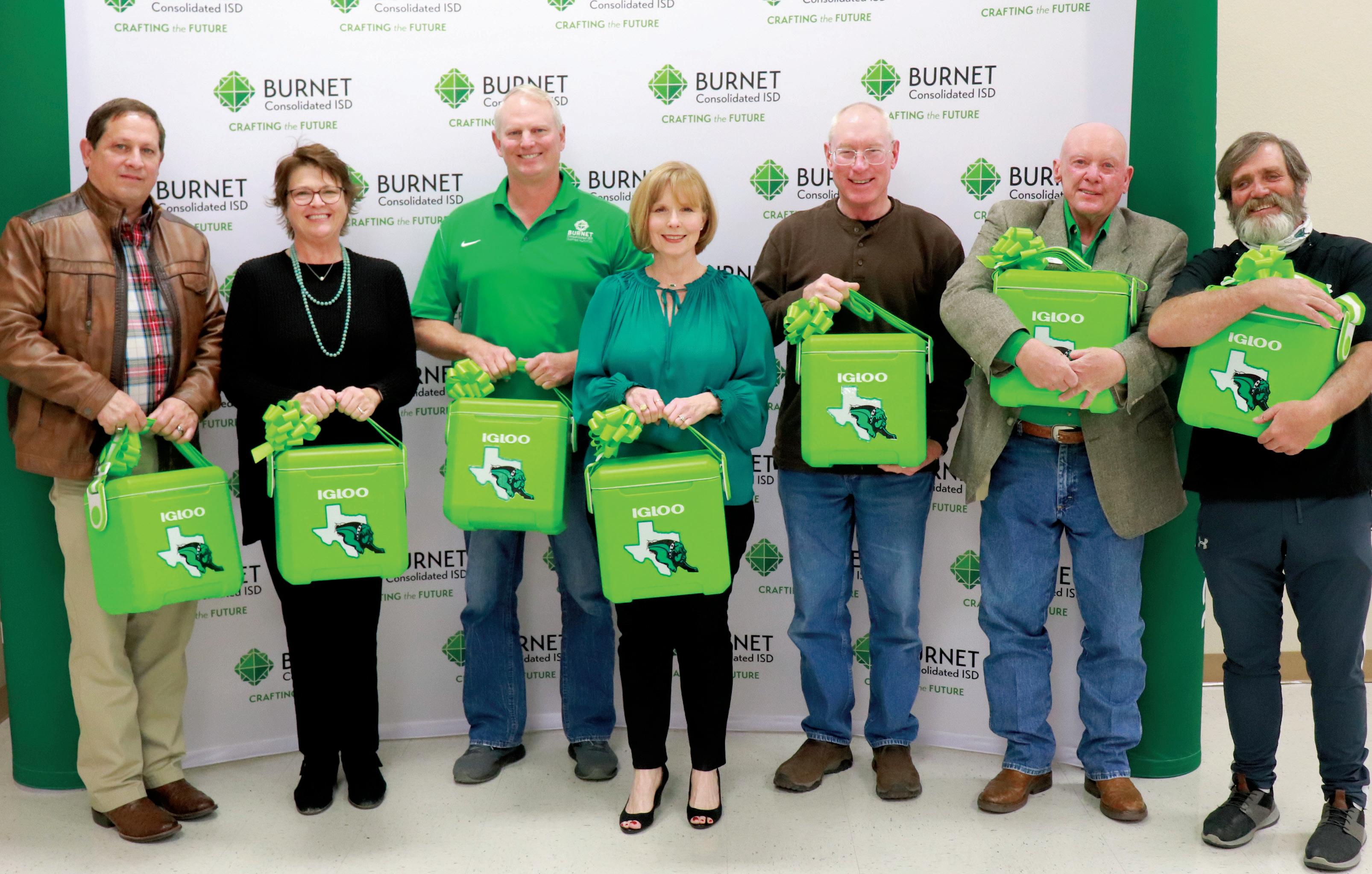
Quinlan ISD also honored its board with an appreciation dinner—featuring steaks grilled by the mayor and police chief—and notes from students and staff placed in a “Message in a Bottle” sack. And in Hempstead ISD, board members were treated to a lively “Navigating to Success” video presentation.
Many other districts across Texas also showed their appreciation to their boards with videos, slide shows, special ceremonies, and thoughtful celebrations.
At left, Burnet CISD leadership team members show off their personalized snack boxes presented at a special School Board Recognition Month ceremony; at top left, Quinlan ISD Board President Kenny Stone and his wife, Cathy, pause for a photo during Quinlan ISD’s board appreciation dinner; at top right, Krum ISD trustees each received student-created portraits, such as this example crafted for Krum ISD Trustee Brooke Fouts.
Photos courtesy of respective districts

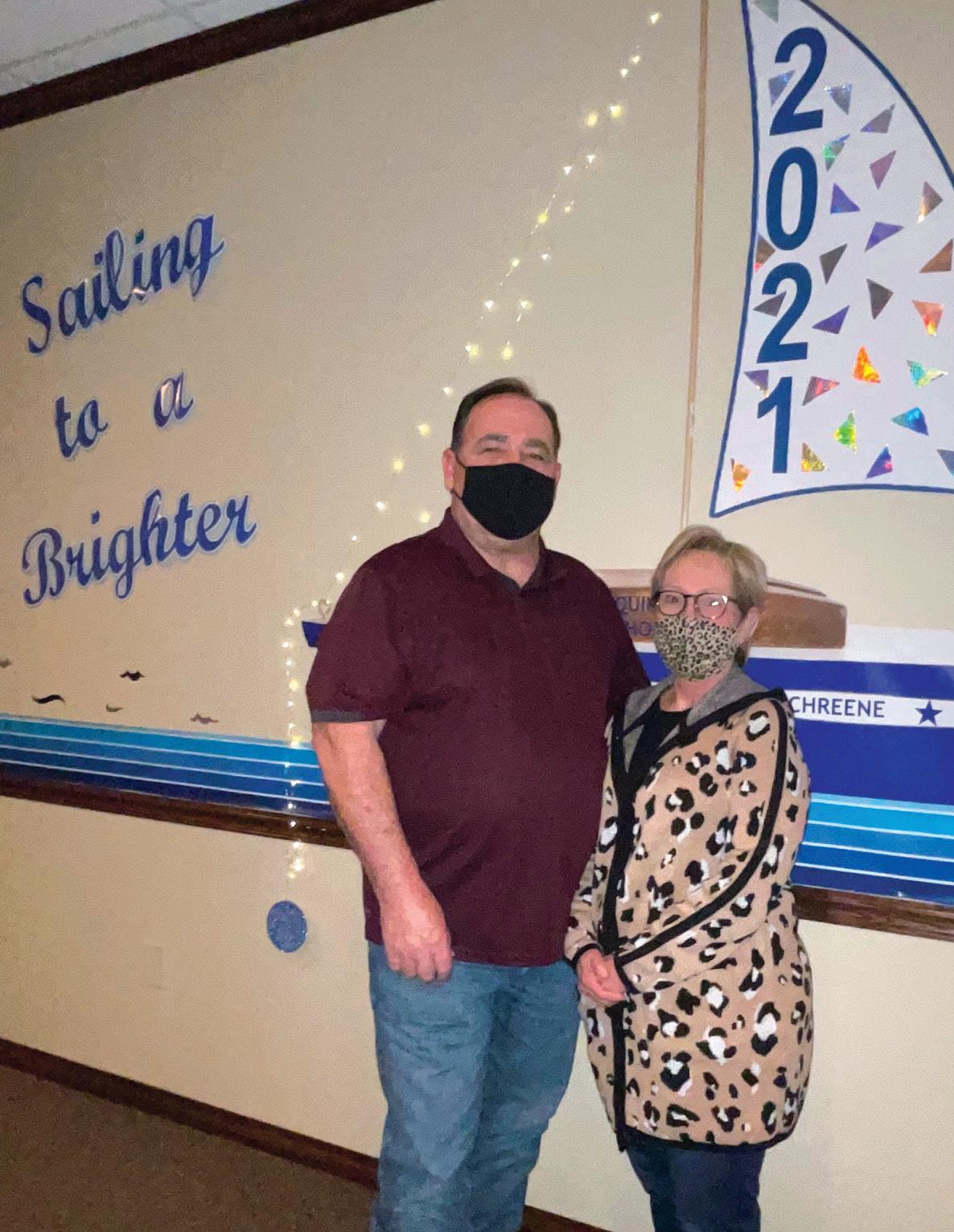

Nominations for the 2021 Superintendent of the Year (SOTY) awards program are due to designated regional education service centers (ESCs) by April 9.
Since 1984, the SOTY awards program has honored outstanding administrators for achievement and excellence in public school administration. These school leaders exhibit exemplary and visionary leadership toward improving student performance. They are chosen for their strong leadership skills, dedication to improving the quality of education in their districts, and commitment to public support and involvement in education.
A local school board that is currently an active member of TASB may nominate its superintendent. Nominees must meet the following requirements:
• Have served as a superintendent of the district since September 1, 2018
(interim positions do not count)
• Be a member of the Texas Association of School Administrators (TASA)
• Be certified and meet the State Board for Educator Certification continuing professional education requirement
• Be an active superintendent at the time of the 2021 TASA | TASB Convention

Superintendents who receive the top state award cannot be nominated again during the following five-year period. This rule does not apply to superintendents who were named regional winners or state finalists.
Regional Screening Committees. ESCs coordinate regional screening; school board members serving on regional screening
committees are from districts that do not have superintendents nominated for the award and do not have board members on the TASB State Selection Committee. Each regional screening committee will submit one nomination to the state committee. State Selection Committee. The State Selection Committee is typically composed of TASB directors appointed by the TASB president to serve on the Association’s Member Services Committee. A director may not serve if the superintendent from his or her district is being considered.
For more information, go to tasb.org/ soty H
Former TASB President Charles Wade, a longtime member of the MonahansWickett-Pyote ISD Board, passed away January 3. Wade served as TASB president in 1989-90.
Born in 1928 in Sweetwater, Wade was a resident of Denton and a member of the North Texas Church of Christ. He attended Abilene Christian College and graduated from Texas A&M University in 1949. Wade served as president of the First State Bank

of Monahans from 1968 to 1998. During his tenure on the Monahans-WickettPyote ISD Board, Wade served as president, as well as other officer positions.
Wade is survived by his wife of 73 years, Annette; his sister Montie Mary Spaulding; his children Mike Wade, Catherine Rice, Melissa Hunter, John Paul Wade, and Stephanie Picquet; and four grandchildren and four great-grandchildren.H
The TASB Executive Search Services Difference:
• Hands-on, relationship-focused service
• Broad local and state knowledge
• Personalized and thorough search process
• Education industry specialist
• Satisfaction guaranteed
“Our board was pleased with the assistance and insight provided by TASB during our search process. TASB helped the community, faculty, and the board identify the characteristics and qualities wanted in the next superintendent. This allowed the board to select a proven leader and great fit for our community.”
tasb.org/ess
Clay Cole, Liberty Hill ISD
September 24–26, 2021 • Dallas
Kay Bailey Hutchison Convention Center
Texas school board members and superintendents rely on Spring Workshops to receive information and network with educational leaders.The schedule looks different this year as we navigate COVID-19 guidelines. Some workshops have been postponed until 2022, and many will be virtual events. The high-quality training you have come to expect will still be provided, and you still have the opportunity to earn Continuing Education Credit hours.
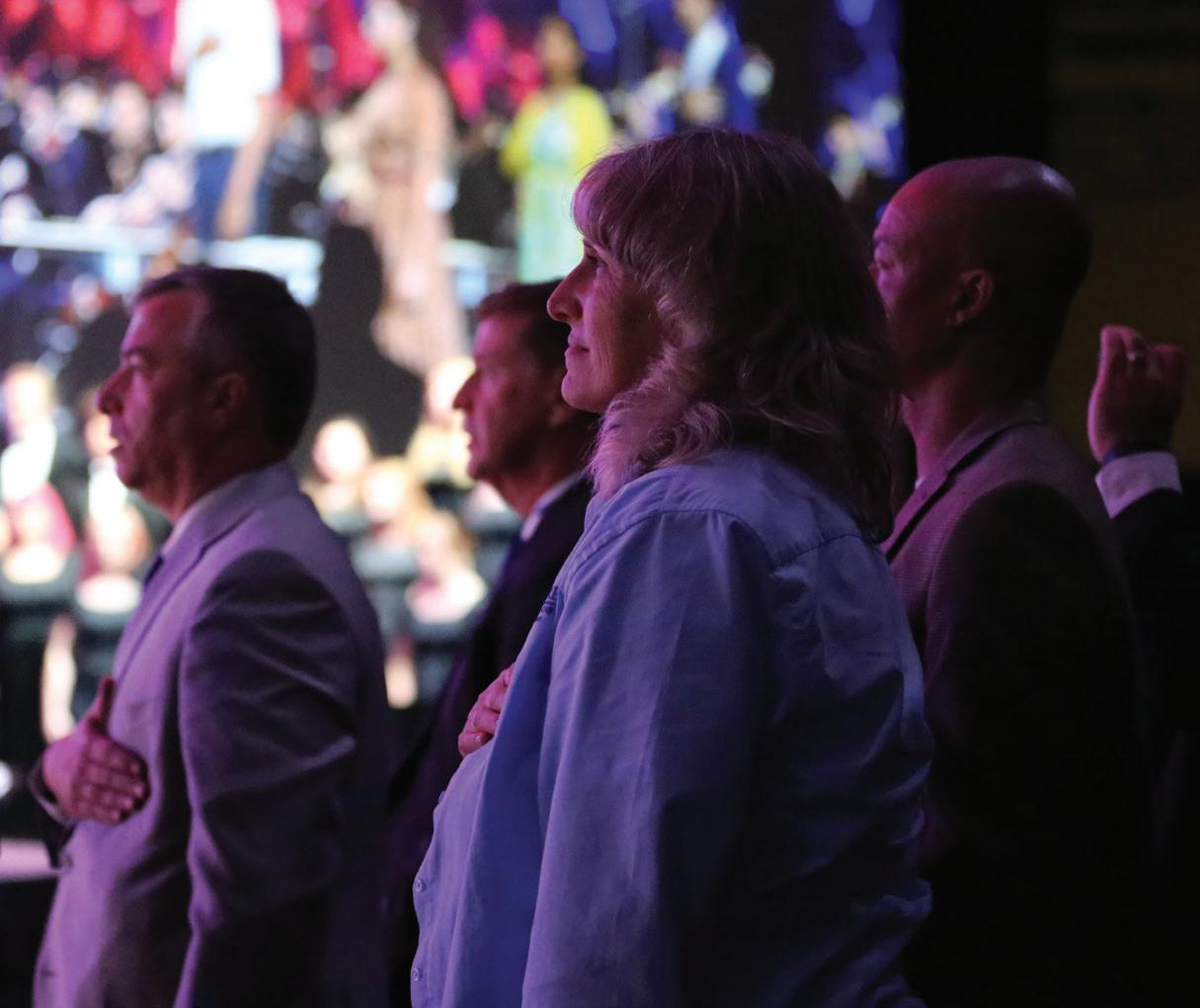
The following schedule is tentative
March 22 • Iraan-Sheffield • Virtual
March 29 • Wichita Falls & San Angelo (ESCs 9 & 15) Joint workshop • Virtual

April 6 • Nacogdoches • Virtual
April 14 • Houston • Virtual
April 20 • Lubbock • Virtual
April 26
May 5
May 11
May 12
May 13
Virtual
Virtual
Commerce
Canyon
Abilene
May 14 & 15
May 18
May 20
Virtual
Hybrid
Hybrid
South Padre
Virtual





The Mexican American School Boards Association (MASBA) is accepting applications for its student scholarships. For 2021, MASBA will allot one scholarship to each member district. Applications are due April 1.
In other news, MASBA has moved its annual conference to September. Scheduled for September 9–12 in San Antonio, the conference will be a celebration of Mexican American studies and the fifth anniversary of the state University Interscholastic League Mariachi Festival.
For more information, visit masbatx.org
The Texas Caucus of Black School Board Members (TCBSBM) will hold its 2021 Educational Summit virtually March 17-20. Additionally, TCBSBM has moved its student scholarship application process online; the 2021 application is available for viewing at tcbsbm.net. Deadline for application is March 31.
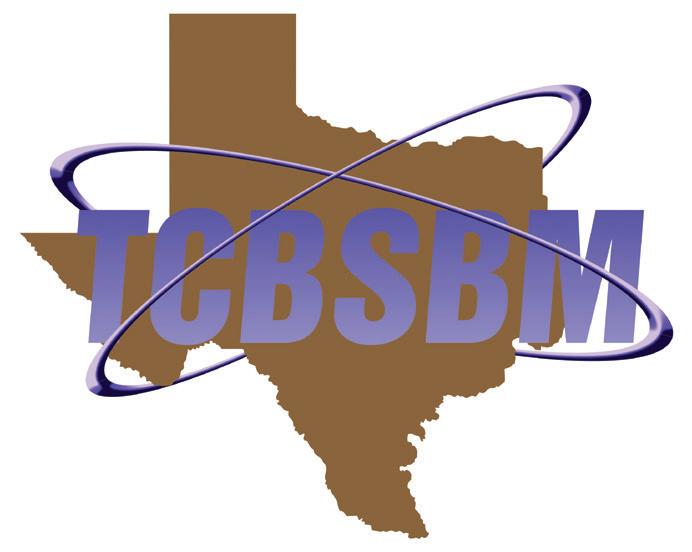
If you have a short news item you would like to submit to Bulletin Board, email roger.white@tasb.org.
The median starting salary for a new Texas teacher is $43,250, and the highest reported entry salary is $60,000, according to the results of the most recent TASB HR Services survey. Responses came from 56 percent of districts, an increase over previous years. The vast majority of districts pay shortage stipends to teachers in at least one identified shortage area. The full results of the survey are available to TASB HR Services members in TASB HRDataSource™.
Key teacher findings for respondents include:
• Median starting salary for a new teacher is $43,250, down 1.7 percent from last year. Decreased statewide medians are due to an increase in participation among smaller districts. The highest reported entry salary is $60,000.
• Median teacher average salary is $51,989, down 0.3 percent from 2019–20 (also influenced by the increase in small district participation).
• The vast majority, 82 percent, pay shortage stipends to teachers in at least one identified shortage area.
• Median pay increases across all pay groups (teacher, administrative professional, clerical paraprofessional, and auxiliary) is 1 percent.
• Of responding districts, 34 percent did not give a pay increase for the 2020–21 school year, while 11 percent reported a one-time payment.
All participants were given an opportunity to provide suggestions or comments about improving the online survey. The feedback will be reviewed and factored into improvements for next year.
Of 1,020 districts, 576 participated as of data analysis, representing 56 percent of districts in Texas. For districts with 3,000 or more students, participation was 85 percent. See full survey results at tasb. org/services/hr-services/salary-surveys/ documents/tchr-highlights-2020.pdf
Need
All of our board development opportunities are designed to help you make better decisions to improve student success.

Evaluating and Improving Student Learning Outcomes (EISO)/SB 1566 training is required every two years.
If you are new to the board or took this training two years ago, now is the time to sign up.
Two convenient ways to access training:
• With entire board and superintendent team
n Live or virtually
n Get team-building credit
• In our interactive webinar series
n Three one-hour modules: March 23, 25, and 30, noon–1 p.m.
n Learn with trustees from across the state
Sign up for the webinar series at events.tasb.org, or contact us about other opportunities.

Ask us about customized team-building services that:
• Assess performance
• Clarify roles and relationships
• Set direction for the future
tasb.org/board-dev